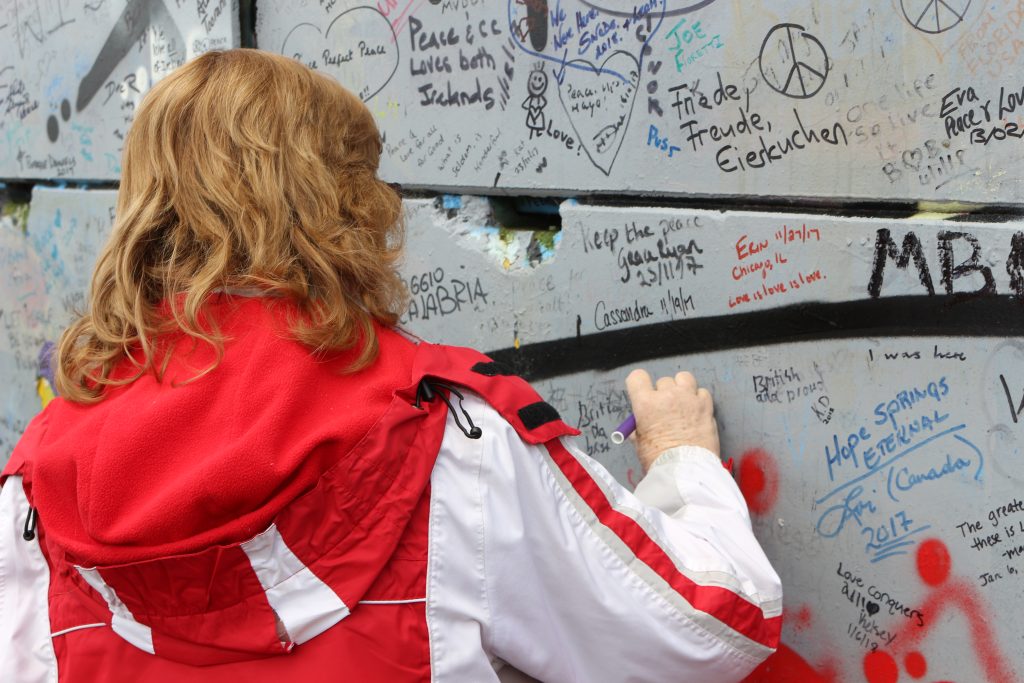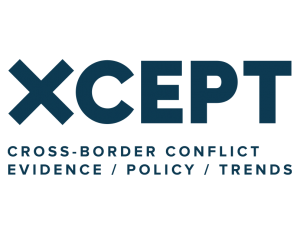By Pauline Zerla

Photo: Belfast, 2018: a women writes on the wall of peace commemorating the violence that happened in Northern Ireland. Credit: Shutterstock/mynewturtle.
“People don’t want to go back to the past … but some people have to deal with the past.” This reflection formulated by youth in Northern Ireland reminds us of the long-lasting impact of conflict and begs the question whether the impact of trauma, and the weight of a violent past, can also be felt by those who did not directly live it. This question has recently been met with growing interest in different disciplines. In conflict settings in particular, the legacy of trauma is often seen as either supporting peace efforts or fueling further violence.
What is (inter)generational Trauma?
Research on intergenerational trauma, also referred to as transgenerational or historical trauma, is generally understood as exploring how legacies of historical and cultural events impact future generations. More widely, it examines how traumatic events, such as war, violence, and genocide, affect the children, grandchildren, and future genealogies of survivors. These legacies can affect individuals, family environments, community social ecologies, and wider historical narratives.
Researchers across disciplines look at these trauma legacies in different ways. In the 1960s, intergenerational or historical trauma was first researched by examining long-lasting trauma among Holocaust survivors and their families through a focus on traumatic memory. Since then, the study of intergenerational trauma has developed in different scholarly directions, providing us with a better understanding of the process of intergenerational trauma and its impact. One area of research has focused on the aftermath of violence, particularly recent studies examining the intergenerational traumatic effects of slavery and colonialism, and has brought with it recognition that trauma impacts communities beyond immediate survivors.
Biology, Family and Social Environment
Studies from clinical, societal, and historical perspectives have helped us understand intergenerational trauma specifically during or after conflict. For example, in a 2014 UCL study, researchers examined the intergenerational impact of war on children. They argued that, while the immediate effects of war on children were well studied, little was understood about the ways in which conflict could impact children across generations. They wanted to find out what the social and cultural environment could tell us about the multigenerational transmission of trauma. By examining exposure to violence, trauma, and stress, the researchers found associated impact in how these experiences affected further generations.
Maternal exposure to violence, specifically, suggests consequences on children’s health. In the Democratic Republic of Congo, children born out of conflict-related sexual violence are more likely to experience community stigma, which in turn can affect their mental health. In Gaza, researchers found “a strong association between maternal symptoms of depression, anxiety and PTSD, and PTSD symptoms in children”. This research encourages practitioners to consider stress and trauma in conflict experienced by parents, and mothers specifically, as factors influencing health and wellbeing outcomes of their children, in both conflict and non-conflict settings.
Beyond maternal impact, several studies have explored the legacy of parental and family culture in transgenerational trauma. Several studies exploring how trauma can be transmitted among refugee families acknowledge the significant role played by parents and families in how trauma is processed by children. This suggests that children whose parents have experienced traumatic events are more susceptible to mental health difficulties. But what might this look like in practice? Trauma experienced can create psychological, social, and economic challenges that impact the environment in which children develop. Survival mode is the way in which this struggle has been described by Ukrainian descendants of the 1932–1933 Holodomor genocide: a “constellation of emotions, inner states and trauma-based coping strategies emerged in the survivors during the genocide period and were subsequently transmitted into the second and third generations.” While research remains limited, the result of this transmission is consequential. The physical health and wellbeing of survivors can be impacted by events that took place decades earlier.[1]
Historical Narratives and Cultural Trauma
Given the transmission of trauma within families, historical legacies of trauma matter. If the experiences of parents, and the environment in which children are brought up, impacts their mental health, so do the stories they tell. For Holocaust survivors, this fact has long been acknowledged. Memory and Holocaust studies have illuminated how children carry the burden of their parents’ trauma and help us reflect on how trauma is processed in families and how stories from the war are told. Memory and migration researchers further consider how narratives of war, of migration, and of trauma, can be transmitted through family and community histories.
Professor Joy Damousi explores the transmission of war experiences among Greek migrants and the ways in which WW2 trauma narratives are transmitted to second generation migrants. The author suggests that the ways these narratives are shared by those who lived them is a piece of the puzzle to understand migrant experiences. In other words, historical narratives of war and trauma influence the lives of migrants beyond first generations. In Australia, these experiences have been linked to a culture of silence impacting social inclusion and dislocation. Through witnessing the trauma histories of their parents and families, children can be passed on the experience of conflict. In a book entitled Haunting Legacies: Violent Histories and Transgenerational Trauma, Professor Gabriele Schwab considers transgenerational memory and asks how children may remember events they have not lived themselves. In his work on “postmemory” among Lebanese youth, Dr Craig Larkin offers some insights. Referred to as a socially experienced phenomenon or a traumatic rupture, he suggests that postmemory is the way in which the current generation is connected to, and distanced from, its collective, and potentially traumatic, past. Transgenerational trauma is experienced in the aftermath of the Lebanese civil war and contributes to explaining the continuation of communal animosities and feelings of dislocation among local communities. Years after violence has ended, these generational trauma stories remain.
Beyond an individual’s biology and their environment, social processes and narratives can shape generation after generation. Although some of the evidence remains thin, particularly when it comes to specific transmission mechanisms of trauma across generations (biological, social, psychological), there is a wide recognition that such processes take place. As we have seen, the experience of children after conflict is strongly influenced by the experiences of their parents. The historical narratives told after conflict can shape upcoming generations, even after migration. There is no one way that trauma is transmitted, just as there is no one way of experiencing trauma. Transgenerational trauma can find its roots in an individual’s biology, in the experiences of parents, or in the ways in which a society deals with the aftermath of conflict. Further research is required to identify how intergenerational trauma is transmitted and, therefore, how it can be addressed. Finding answers to these questions will help inform relevant policy responses for communities suffering cycles of violence and for societies still dealing with the legacies of the past.
Pauline Zerla is a research assistant on the XCEPT Research programme, at King’s College London, which aims to understand how conflict traumas can affect mental health and pathways to violent or peaceful decision-making over time.
[1] Another area of research developed in recent years is epigenetics. The field has focused on transgenerational trauma and yielded intense debate. For a discussion and overview of the debate on this question, see: https://www.nytimes.com/2018/12/10/health/mind-epigenetics-genes.html or https://www.bbc.com/future/article/20190326-what-is-epigenetics. Importantly, further research testing biological, individual, and societal mechanisms of transmission, such as biological, individual, and societal pathways, should nonetheless continue.

This publication was produced as part of the XCEPT programme, a programme funded by UK International Development from the UK government. The views expressed do not necessarily reflect the UK government’s official policies.

